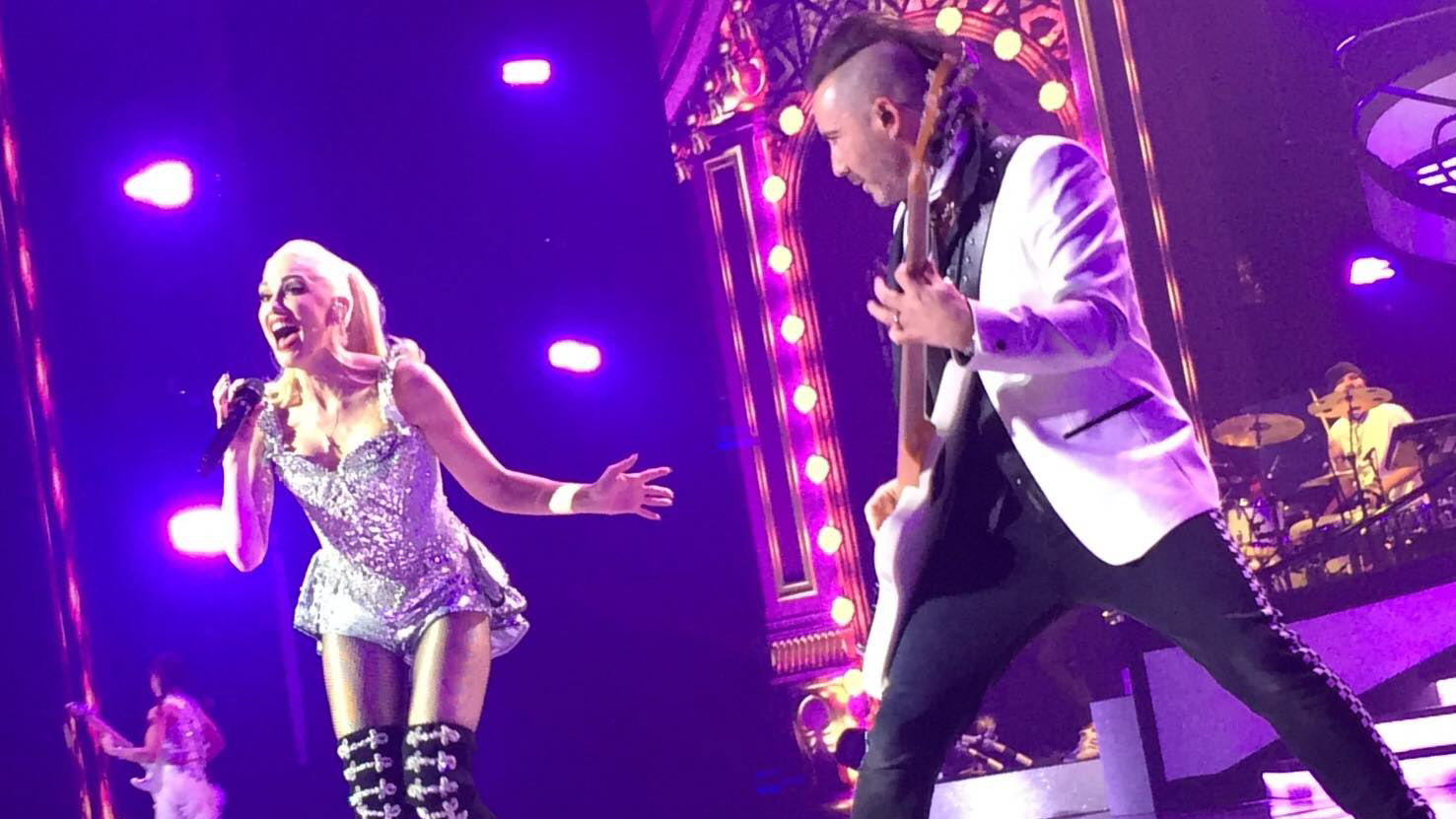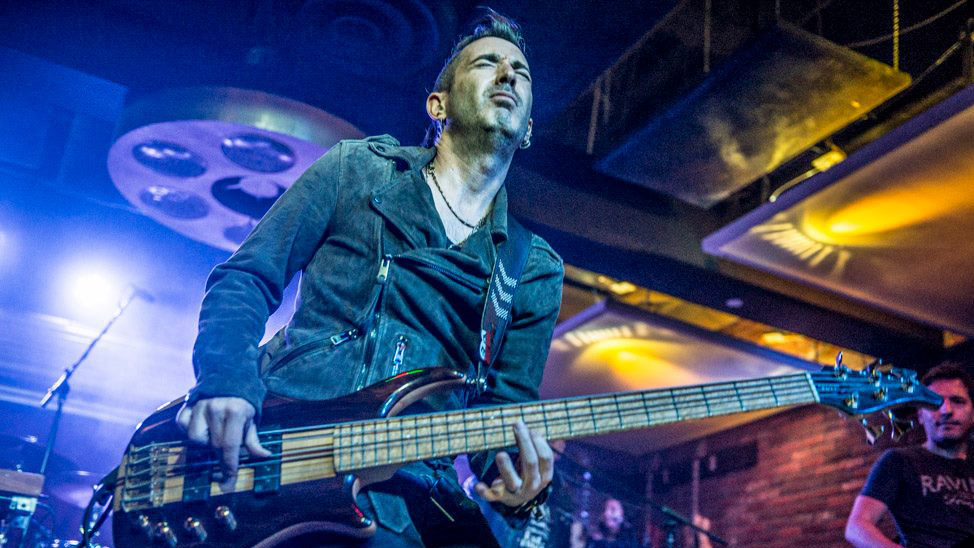Session ace Derek Frank's top tips for bassists: "You don’t get gigs by staying in your bedroom posting Instagram and YouTube videos"
Gwen Stefani and Shania Twain's right-hand man on how to diversify and succeed in music

Bassist Derek Frank’s resume as a studio and touring musician is extensive and filled with high-profile gigs.
As a member of the 10-piece band backing the Dancing With The Stars tours (2007 – 2009), he performed in sold-out arenas in the U.S. and Canada, and used the time between soundchecks and shows to write his solo album, Let The Games Begin.
In 2015, he joined Shania Twain's touring band. The following year, he joined multi-platinum classic pop band Air Supply on the road. In April 2018, he began working with Gwen Stefani, in time for the start of her ongoing Las Vegas residency.
Other projects include blues artist Mindi Abair & The Boneshakers, indie-rock band The Dirty Diamond, singer/songwriter Daniel Powter, monthly Soundcheck Live evenings at the Lucky Strike in Los Angeles - and that’s merely scratching the surface of his credits.
Frank grew up in Pittsburgh, Pennsylvania, where, as a youngster, he discovered music on MTV. Interest quickly became passion - he took guitar lessons, transitioned to playing bass, and soon was jamming in cover bands.
His family relocated to Cleveland, Ohio, during his high school years. There, thanks to the tutelage and mentorship of his high school band director and supportive parents who recognized and encouraged his talent, he flourished.
The bass and guitar rigs are offstage - it’s a totally clean stage with no amps or pedalboards - so I’m using a Kemper Profiler
“My high school didn’t have any bass players in the music program, so the band director, Craig Kepner, immediately put me in the jazz band,” he says.
Want all the hottest music and gear news, reviews, deals, features and more, direct to your inbox? Sign up here.
“He also didn’t have enough low brass in the concert band, the pit orchestra, or the marching band, so he had me play the bass in everything. He gave me a lot of opportunities, and put me into a lot of things where I could grow as a musician by reading charts and playing a lot of different styles.
“When he heard of opportunities outside the school, he told me about those. He told me about the Interlochen Arts Camp and the Ohio Jazz Orchestra for Youth, which was an all-state jazz band. I auditioned and got the gig, which was pretty prestigious for Ohio high school students. Through that orchestra I formed a jazz quartet, and we played local gigs and for professional musicals around town.”
Following his graduation, Frank’s parents learned through a friend that the Royal Caribbean Cruise Line was auditioning musicians. After auditioning and getting hired on, this became an annual summer gig while attending the University of Miami jazz program. After college, he moved to Boston. By then, his parents had moved to Los Angeles. A plan to spend the summer with them led to calls for gigs, and he’s been there ever since.

Onstage with Gwen Stefani, he uses two Fano JM4 basses with rosewood and maple fingerboards, respectively.
“Both are standard tuned, four-string models with Hipshot Xtenders, so that I can drop the E string to a D,” he says.
“On a few songs, I play a Warwick CV 5 that has been modified with Nordstrand pickups and preamp. I use La Bella strings on all my basses. The bass and guitar rigs are offstage - it’s a totally clean stage with no amps or pedalboards - so I’m using a Kemper Profiler. I profiled my Aguilar rig into the Kemper, and I use that as my amp along with a lot of the built-in effects in the Kemper.”
When Derek Frank spoke with MusicRadar, he was in rehearsals with Stefani in advance of gigs in Dubai and Hong Kong, prior to returning to the US for some corporate shows, then picking up again in Las Vegas from July through November.
“I built my career around being a bass player for hire, a sideman,” he says, “and I try to keep my schedule full with a balance of session work and touring - touring providing maybe 70 per cent of my employment. So the tips I’ll provide pertain to that.”
1. Diversity is key
“These days, work for musicians can be scarce. There are definitely more musicians than there are gigs, so the more styles you play, the more chances you have of filling up your calendar.
In order to play all these styles authentically, you have to listen to the music and pay attention to the nuances
“Of course, in order to play all these styles authentically, you have to listen to the music and pay attention to the nuances. Not just the notes, but also the tone, feel, placement, note length, and approach.
“For me, it came from liking many different styles of music. I went through so many musical phases when I was growing up, and when I’d move on to another style, I didn’t forget about the previous one. All the aspects stayed with me.”
2. Reputation is everything
“Work comes through word of mouth, so you want the words coming out of people’s mouths to be 100 per cent positive.
“You want to be known as the player who always does his homework, shows up on time, plays for the song, and is easy to get along with. That seems simple enough, but a lot of people don’t get that.”
3. Step away from social media
“You don’t get gigs by staying in your bedroom practising all day and posting Instagram and YouTube videos. That stuff can be impressive to people - you can get a lot of likes and followers - but it doesn’t translate into actual work.
We had one player audition who was a YouTube sensation with half-a-million followers. When he came in, there was no way he could have cut the gig
“You have to play with people, you have to interact with people, and just because somebody posts these ripping videos on Instagram and YouTube doesn’t mean they can play well with others.”
“When I was auditioning for an artist a few years ago, we had one player audition who was a YouTube sensation with half-a-million followers. When he came in, there was no way he could have cut the gig. He couldn’t play with a click, he didn’t have the vibe, and he didn’t seem used to playing with people.
“That social media stuff just doesn’t translate to the real world. You have to sit in with bands, play with people, and make friends. That’s how you get gigs.”

4. Put yourself in different scenes
“If you’re going to sit in, network, and get to know people, don’t just do it with one style of music. I’ve got my foot in so many different scenes around LA, stylistically, because first of all, I like all the music, and second, if I were only interacting in one circle, it would limit the number of musicians that could potentially call me for work.
“If you want to be a diverse working musician, check out a lot of different styles and scenes. Again, the more people you know, and the more circles you’re running in, the more chances you have of getting work.”
5. Use every gig to practise and improve
“Back in the day, I did a ton of wedding gigs and bar gigs. I looked at them as opportunities to improve my playing, meaning I would try to work on different skill sets.
“If you’re playing cover gigs, you’re playing a lot of styles, so I would do my best to nail the tone, study the player I was copying, and incorporate aspects of that person’s playing into my own vocabulary. If you’re not doing a gig that’s exactly what you want to do, use it as a springboard, as a learning experience, as practice.”
When I got the Shania Twain gig, I immediately called a friend of mine who is a vocal instructor and asked if I could take lessons. I practised like mad to get my vocals together
“Even on [major] gigs, it’s, ‘How do I come out of this a better player?’ When I joined Shania’s band, I had never done a country gig. Also, that gig required a lot of singing, and I hadn’t done a lot of background vocals. I hadn’t done any serious harmonising.
“So when I got that gig, I immediately called a friend of mine who is a vocal instructor and asked if I could take lessons. I practised like mad to get my vocals together, because, first of all, I want to be as good as I can be on every gig, but also I figured, ‘If I can come out of this tour being a confident backup singer, then there’s another skill I developed from being on this tour.’”
“In learning Gwen’s material, I really got to study Tony Kanal, the bass player from No Doubt. He’s a guy I was a fan of, but I never dug into the nuances of his playing and his tone. Playing all those songs, I wanted to be as authentic as possible, so I really dug in, and now aspects of his playing that were totally foreign to me before, things I didn’t do in my own playing, now I’ve got that in my bag of tricks.
“Also, from a performance standpoint, I move around on Gwen’s gig more than I ever have on any gig, so that’s another way of improving my stage performance and energy onstage, like, ‘How I can still play a clean bass line and not be sloppy when I’m running around.’”
6. Support the singer
“When I was starting out, singing one rhythm and playing another was difficult, so I had to slow things down. I practised by saying the words in rhythm as I was playing at slow tempo, and then increasing the tempo. Once I could say the words in rhythm with my playing, I could put notes to the words. It’s practising two things at once.
“I sang backup on a few of my gigs over the years, but I didn’t get serious about it until I joined Shania. Now I see what a valuable skill it is for anybody, but again, it’s one of those things that you need to practise, and in time you become better and certain aspects become second nature.”
Our job as bass players is to support the singer, make the singer sound good, and not step on the vocals
“Our job as bass players is to support the singer, make the singer sound good, and not step on the vocals. That’s where the phrase ‘playing for the song’ comes into play. You don’t want to play licks when the singer is singing.
“Being a singing bass player helps, because if you’re singing backups, you’re going to keep your bassline simple just because you’re playing two rhythms at once. I’ll rarely play some kind of bass lick while I’m singing a back-up part - one, because I’m stepping over myself if I do that, but also, it’s difficult. I keep my bassline simple most of the time unless the actual part is busy.
“Practice singing while you’re playing, even if you’re not singing on the gig. Again, it comes down to using every gig as a way to improve your skill set. Or sing on the gig without a mic, just to improve, to get you ready for that gig where you do need to sing. I’m not sure that will make you a better bass player, but I think it will make you a better singer, and that’s valuable.”
7. Shape up
“It’s really important to be in shape if you’re a touring musician. You don’t always sleep well, you’re sitting in one place on planes and busses, eating whatever catering provides, and a lot of times there’s alcohol around. I found that I needed to take care of myself and be in shape.
If I wasn’t in good shape and didn’t take care of myself, I would die on this show!
“The gig I’m doing with Gwen is the most physical show I’ve ever done. We try to embody some of the spirit of No Doubt, so we’re running, jumping, dancing, sweating, and if I wasn’t in good shape and didn’t take care of myself, I would die on this show!
“You have to be in good cardiovascular shape to play physical shows like that and to travel, because it can really beat you up. You’ve got a 10-pound weight strapped to one shoulder, you’re running around, and you’re trying to focus on playing. It can be physically demanding, and you need your lung power as well.”
8. Develop multiple revenue streams
“The devaluation of recorded music has trickled down into touring, live performance, studio budgets, and recording budgets. A lot of artists, producers, and songwriters are cutting back on what they’re spending. This means we have to be creative in how we earn our income. We can’t put our eggs all in one basket. We can’t say, ‘I’m only going to be a touring musician,’ or ‘only a studio musician’. You’ve got to be open to many different things.
People can teach, record at home, produce, write, do coaching and masterclasses if you feel you’ve got something valuable you can share
“People can teach, record at home, produce, write, do coaching and masterclasses if you feel you’ve got something valuable you can share in a group setting. I have my Bass Tracks Online so that I can record at home or on tour. I try to book clinics when I’m on the road, if there are schools where I think it would be a good thing. Aside from extra income, it’s also a way to give back. There are a lot of things we can do aside from playing to earn income.”
9. Expect the unexpected
“Sometimes you just have to go with the flow and trust the universe. This can relate to both positive things and negative, meaning sometimes great new gigs come out of the blue when you least expect it, but sometimes longterm gigs can end the same way. Some of the calls I’ve gotten for the best gigs have come when I was not expecting them at all. It was just a random phone call saying, ‘Can you do this tour?’”
“On the negative side, a lot of times artists will decide to change up their bands after a long time, and it can be really frustrating when those gigs end like that. But you can’t freak out.
“Assuming you’ve built up a good network and earned yourself a good reputation within that network, the call for a new gig will eventually come in. This goes back to earning a good reputation, being as good as you can possibly be, and building as many friendships and musical relationships as possible. And then trust that the universe will take care of you.”